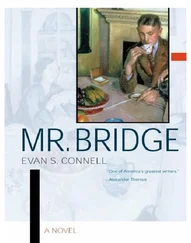Finding herself alone, she looked back and saw him standing with his arms folded, staring into one of the shop windows. She waited a while, thinking he would be coming along, but whatever he saw had hypnotized him. Her curiosity aroused, she retraced her steps. He sensed her approach and looked around with a start. They wandered along as before, but she had seen the object of his attention: a black lace brassiere with the tips cut off.
The more she mulled over this incident the more concerned she became. The French, after all, might do as they pleased; she need have nothing to do with the French, but she must live with her husband. She had lived with him for a long time now, and assumed she knew whatever was worth knowing about him. True, there were occasional surprises once he had told her, and afterward seemed to regret having divulged the secret, that when he was a boy he used to dream of becoming a great composer but the revelations of his nature had seemed meaningless, no matter how fascinating, and she was not apt to dwell on them, but now she did.
Why had he stood there looking? What had he been thinking? His expression had been so serious. Were there things he had never told her about himself? Who was he, really? From all the recesses of her being came the questions, questions which had never before occurred to her, and there on the foreign street she felt lost and forsaken, and with great longing she began to think of Kansas City.
The guidebook spoke of a cafe called Le Dome as having been the haunt of famous intellectuals at the beginning of the century, so there they went to spend an hour or two.
“Picasso used to linger here/’ Mrs. Bridge read from the book, and she went on to read the names of other celebrated individuals who had taken their leisure on this very terrace.
“Here comes Picasso now/’ said Mr. Bridge.
“Oh, I don’t believe it,” she said, looking up nevertheless. In a moment she saw to whom he was referring; it was Morgan Hager, whom they had not seen for several days. Hager was carrying a portfolio under his arm and he was wearing a beret that for some reason made him resemble a fox. He looked startled when he saw them in the cafe, and for an instant seemed ready to flee, but then he smiled and nodded and came over to join them, placing his portfolio in a corner. Mrs. Bridge thought about asking to see his drawings, and after some hesitation she did so. He said the drawings were not much good and she did not press the matter.
“Well/* he said, “I see you’re still here/’ This was not what he meant to say, so he amended, “I figured you’d probably left/’ Since this was not right either he said, “I never did know what you were doing here/’ He saw Mrs. Bridge smiling courteously and steadily, and Mr. Bridge observing him with frank curiosity, so he took off his beret and scratched his head, gazed around Le Dome in search of something whereby he might distract them from his inability to make conversation, and he exclaimed, “Oh! Look at that!”
Mr. and Mrs. Bridge turned and looked and they saw a shaggy girl, rather pretty in a gypsy sort of way so Mrs. Bridge thought who was wearing a silk blouse that was not tucked into her skirt but was simply tied in a loose knot so that a good deal of midriff was showing. She was laughing and shaking her head in response to the comments of two Frenchmen who were sitting at the next table. One of the Frenchmen took out his wallet and slipped a bill under the saucer of her coffee cup, and at this she promptly untied the knot in her blouse and straightened up, revealing her breast to her neighbors as well as to anyone else who cared to look, whereupon there was a burst of clapping and much laughter not only from the two businessmen but from everyone else in the cafe, with the exception of Mr. and Mrs. Bridge.
“Well,” said Morgan Hager suddenly, “I guess I’d better be running along.”
“Oh, must you go?” inquired Mrs. Bridge.
“Yes, there’s a girl at the ho ah, I mean, I’ve got some plans for the next few hours.” He paused. “It’s just that I’d forgotten about Kansas City what the people were like, if you know what I mean.” He stopped again. “Well,” he said, picking up his portfolio, “it’s sure been an experience!”
Mrs. Bridge was not certain what he meant, but replied courteously, “Good-by, Morgan. We’ll tell your parents we saw you.” To which Hager responded with an uneasy grin and vanished swiftly into the crowd on the street.
“I never knew there were so many artists/* she observed as they wandered along the quay. “How do you suppose they keep from starving to death?”
Mr. Bridge had never been greatly interested in art, but if this was how she wanted to spend their final day in Paris it was all right with him. Some of the pictures in the book stalls he did rather like; then, too, it was a warm sunny afternoon near the end of August and he was pleased, and he made up his mind to buy her a painting. He said nothing, but he began to pay more attention, and near the cathedral of Notre Dame she paused to admire a watercolor of the city.
“Parlez-vous Anglais?” Mrs. Bridge politely inquired of the old gentleman who sat beside the stall in a canvas chair. He shook his head and went on smoking his pipe.
“Well, combien?” she asked, pointing to the one that struck her fancy.
“Vingt mille,” he answered without looking around, and continued smoking.
“Vingt mille,” she repeated, for she had been listening closely, knowing he would speak in French. “Now, let’s see. Vingt is twenty, I believe. And mille is thousand. Well, that sounds like a lot/* Whereupon she opened her handbag and took out a little booklet which equated American money with virtually everything on earth. Having learned how much it would cost in dollars, she exclaimed, “Oh, I’m afraid that’s much too much,” and shook her head and regretfully moved along, remarking to her husband, “I’m sure he’s spotted us as tourists.”
Mr. Bridge took a long, shrewd look at the picture so as not to forget it. He did not think it was very good in fact he was of the opinion that Ruth had done better paintings when she was in high school but he seldom offered an opinion on a subject with which he was not familiar. Later that afternoon, back at their hotel on the Champs Elys^es, while she was packing the suitcases, he went out, hired a taxi, and drove to the quay, where he bought the painting and arranged to have it shipped to Kansas City. The next day as they were getting settled on the train for the trip to the Riviera he observed rather dryly that he thought he knew how the Parisian artists kept from starving, but since she had no idea he had bought the painting for her this remark meant nothing, and she replied as she took off her hat that she supposed they must manage some way.
A telegram was waiting for them in Monte Carlo. Douglas, knowing the date of his parents’ wedding anniversary, sent this message: MAY I TAKE THE OPPORTUNITY EXTEND FELICI-TATIONS UPON MEMORABLE OCCASION AND IN BEHALF ENTIRE COMPANY EXPRESS HOPE YOUR CONTINUED SUCCESS.
Mrs. Bridge was touched by his thoughtfulness and wrote to him, “It was awfully sweet to hear from you on our anniversary, but I do think the American Express company must have gotten their messages mixed up….”
Before leaving on the trip she had checked over the luggage in the attic and concluded they did not have enough, so she had gone downtown and bought three elegant, darkly burnished leather suitcases. They were so beautiful that she was easily persuaded by the salesman to buy a set of canvas covers to protect the leather. These covers, to be sure, were ugly as coarse as Boy Scout pup tents but she bought them and had them fitted onto the suitcases. The covers remained on the suitcases while they were aboard ship, and as they had been in each city only a few days she had not bothered to remove them, but now she decided to see if the leather was being protected. She unfastened one of the canvas jackets, peeled it halfway off, and there as beautiful as though still on display the leather gleamed. Well pleased, she buttoned on the cover.
Читать дальше












